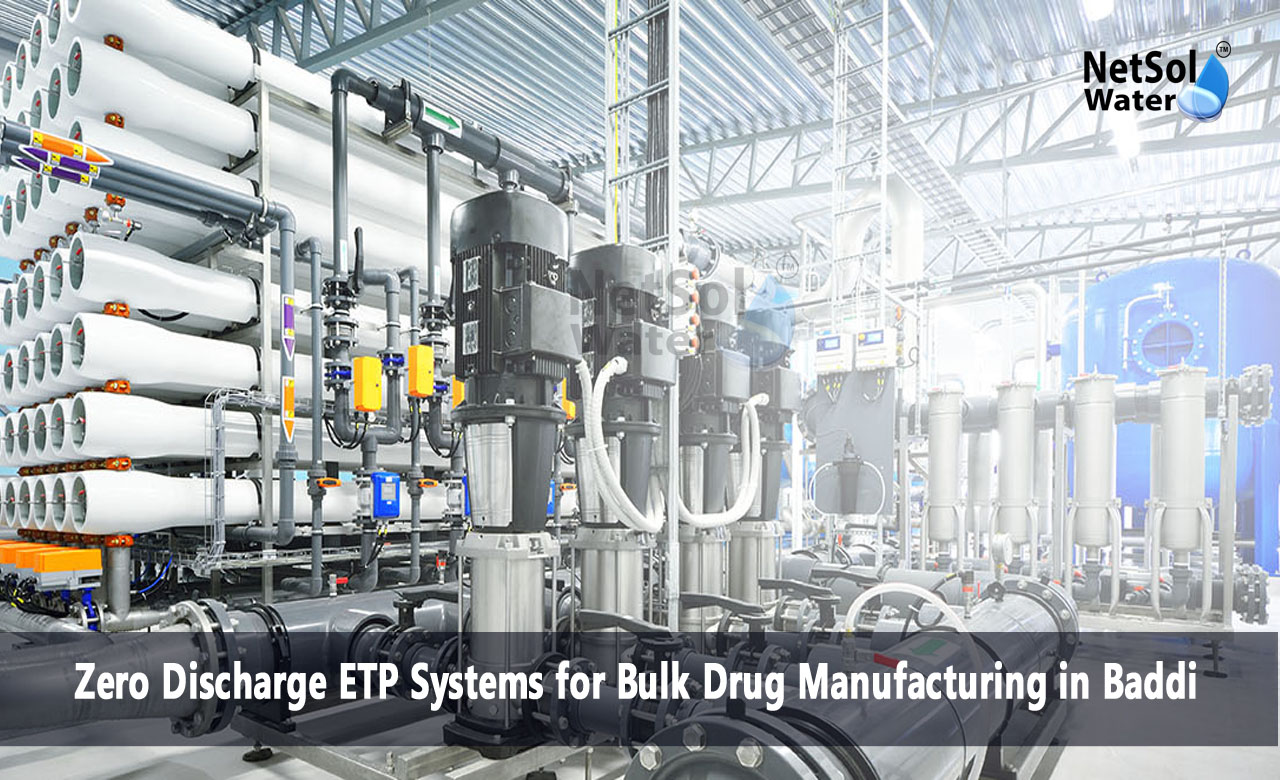Zero-Discharge ETP Systems for Bulk Drug Manufacturing in Baddi
Baddi is located at the foot of the Himalayas and draws attention as a major center for drug production. The town hosts numerous manufacturing units that handle complex chemical processes. In this area water management becomes aconcern. Netsol Water leads as the Effluent Treatment Plant Manufacturer in Baddi and provides solutions tuned to local needs. The company helps plants install zero-discharge ETP systems that convert wastewater into process water. These systems protect the environment and reduce dependence on outside water sources. They deliver treated water that meets strict purity standards. Plants then route this water back into cooling towers and production units. This cycle cuts fresh water use and prevents any pollutant release. As Baddi expands its pharmaceutical output pressure to manage effluent mounts.
Zero-Discharge ETP Systems
Zero-discharge ETP systems bring clear gains for bulk drug makers in Baddi. They aim to avoid any final wastewater release. The systems collect all treated water and return it into operations. This practice cuts pollution and trims water expenses.
System Design Concepts
Design begins by mapping every effluent stream. Engineers spot high load streams and low load streams. They plan to separate these flow paths. This step improves treatment efficiency and curbs energy use.
Treatment Train Overview
The treatment train in a zero-discharge system spans primary removal, membrane filtration and evaporation. The primary stage removes solids and oils. Next the RO Plant section strips dissolved solids and lowers organic load. Evaporators then concentrate the leftover effluent. The evaporation condensate returns to the plant as pure water.
Balance of Water Flow
Every stage must match inflow and outflow rates. Designers set recycle and blowdown rates carefully. They adjust controls to meet process water demand. This fine tuning keeps the system stable and recovers all water.
Benefits for Bulk Drug Manufacturing
Bulk drug makers gain multiple advantages from zero-discharge ETP systems. These systems cut costs and ensure compliance with norms. They also create a cleaner facility and foster community goodwill.
Cost Savings from Water Reuse
Reusing treated water removes the need to purchase fresh water. Plants face rising tariffs for municipal supply. Each liter of reused water lowers the water bill. Over months and years these savings add up significantly.
Compliance with Regulations
Regulators impose strict effluent limits. Plants with zero-discharge systems meet these limits without complex permit work. They avoid risks of shutdowns tied to permit breaches. They also prove that they release no wastewater.
Enhanced Brand Image
Plants that adopt zero-discharge treatment show they care for the ecosystem. Communities and partners view them as responsible neighbours. This reputation supports smoother expansions and better partnerships.
Key Design Elements of Zero-Discharge Systems
Solid design ensures that a zero-discharge ETP system runs without a hitch. Let us examines the main parts and their tasks.
Primary Treatment Units
Primary units capture bulky solids and oils from raw effluent. Screens and sedimentation tanks handle this role. Reducing the load at this stage eases the burden on membranes and evaporators.
Membrane Filtration in RO Plant
Membranes carry out deep purification. They block dissolved solids and organics. A well configured RO Plant stage can recover up to ninety five percent of feed water. Designers pick membranes and set parameters to fit effluent quality and flow rate.
Evaporation and Crystallization
Evaporators concentrate the remaining effluent. This step shrinks the liquid down to a small volume. The resulting condensate feeds back into operations. Crystallizers may process the concentrate further to extract salts or other substances.
Choosing the Right Effluent Treatment Plant Manufacturer
Picking a capable provider shapes the success of zero-discharge projects. A partner familiar with the local scene speeds installation and support.
Local Expertise in Baddi
A local specialist knows the area’s climate and water traits. They design systems that cope with seasonal shifts. They also handle local clearances and approvals with less delay.
Proven Track Record
Providers with many installations offer solid performance data. This record gives buyers confidence in system uptime. Netsol Water stands out as the Effluent Treatment Plant Manufacturer in Baddi and has completed numerous zero-discharge projects here. They support clients through design, setup and ongoing care.
After-Sales Support
Zero-discharge systems demand careful operation and upkeep. A strong support network ensures a quick fix for any glitch. Service teams train staff and supply spares when needed.
Implementation Strategies and Best Practices
A clear plan eases the rollout of zero-discharge ETP systems. Plants can follow a step-by-step path from concept to operation.
Site Assessment and Feasibility
Experts start with a detailed audit of effluent streams. They measure flow rates and pollutant levels and review current treatment steps. This data forms the basis of a feasibility study that estimates costs and payback time.
Project Execution
After design approval the manufacturer handles system fabrication and installation. Engineers oversee piping, wiring and system integration. They then run tests to confirm performance under real-world loads.
Training and Handover
Operators receive hands-on training for monitoring and upkeep. The provider supplies manuals and standard procedures. This training helps plants maintain zero-discharge targets and run smoothly.
Conclusion
Zero-discharge ETP systems deliver water savings, strict norm compliance and an improved local image for bulk drug plants in Baddi. A trusted Effluent Treatment Plant Manufacturer in Baddi can guide every phase of the journey. Contact Netsol Water now for details or to request a consultation on a zero-discharge solution.
Contact Netsol Water at:
Phone: +91-9650608473, Email: enquiry@netsolwater.com



